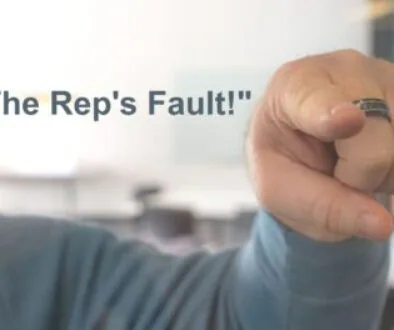The Doctor Doesn’t Meet With Sales Reps
“The doctor doesn’t meet with sales reps.”
Have you ever heard this response when requesting access or an appointment? There have always been HCPs who won’t see sales reps, but your likelihood of hearing this response is increasing.
How do you get around it?
Many med tech reps resort to alternative communication methods, such as connecting on social media, which can be effective if:
1. The doctor is active on social media (SM)
2. You’re able to initiate or enter into a relevant, personalized conversation through SM – which won’t be easy because doctors who don’t want to meet with sales reps don’t want to be pitched by them on SM
What are your other options?
You might think, “I’ll send an email or even a letter. Or better yet, I’ll send a personalized video.”
If you use alternative means of communication just to deliver a sales pitch, you’re validating the doctor’s decision not to see sales reps. And if you’re pitching via a personalized video, you’ve just given them a more personalized reason to avoid you!
If you don’t pitch a product, you might be asking what you should talk about.
One thing matters more than anything else when communicating with prospects…
The message.
Focus on something the prospect is likely to care about or be interested in.
How do you know what that is?
Do your research. Let me give you an example.
Dr. S was a high-volume surgeon in my orthopedic sales territory who “didn’t see sales reps.” He used a competitor’s product, and when I approached him in the hospital to request an appointment, he tersely said, “I’m busy, and I don’t make appointments with reps. If I ever need something, I’ll call you.”
Sometime after that, I was in the OR, covering a surgery on the weekend. The scrub tech on-call scrubbed on all of Dr. S’s surgeries. I was unwrapping trays for her (yeah, we did that back then) and started asking about Dr. S. I said I heard he was an excellent surgeon and asked if she enjoyed working with him. She said she did but shared that the doctor’s being a perfectionist was challenging at times. I asked her to give me an example. She told me that when Dr. S. does a total hip replacement, he’s meticulous about making the leg lengths equal and spends much time on it. She shared that he frequently said, “I know this takes time, but it’s important, and I wish there were an easier way to do this.”
I had just discovered something Dr. S cared about — leg lengths —, and I had a product to help him obtain this goal.
The following week I sent a message to Dr. S employing a rarely used piece of technology — a folded handwritten note. I told the receptionist I had an important message for Dr. S and asked her if she could please bring it to him. It took some coaxing, but she lamented and took the note to the doctor. She returned to the window with a surprised look and said, “Go on back.”
What did my scribbled note say? “Give me 30 seconds, and I’ll show you how hip surgeons measure and restore leg lengths easily.” That was it!
The doctor eagerly examined the device as I explained how it worked. He asked if he could evaluate it on some of the surgeries he had that week.
The hospital bought the device to keep in Dr. S’s hip set, but more importantly, I got to spend time with Dr. S in the OR during the evaluation, which allowed me to find out how he did things and what he valued. This knowledge allowed me to gain access to this doctor (who didn’t see sales reps) almost any time I needed to see him.
The takeaway?
It’s not the medium; it’s the message.
Whether it’s a scribbled note or a high-tech video, it will fail if your message isn’t about something the prospect cares about.
Pitching products rarely gets a doctor’s interest, but discussing a specific issue your prospect truly cares about does and always will.
Do your homework!




